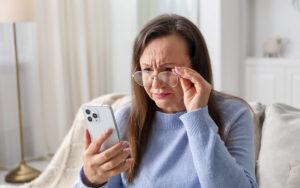Do your eyes get teary spontaneously without any clear triggers? Well, you may have eye allergies. They are pretty common, and you may be a victim suffering in silence. But you can learn more about this.
The information below talks about eye allergies. It includes the causes, symptoms, and even treatment options for people with eye allergies. You will also learn about the many ways you can avoid allergens.
Always see a doctor to understand your symptoms, as they could be something else. But to keep your mind at ease, keep scrolling to determine if you have eye allergies.
What Are Eye Allergies?
An eye allergic reaction is when the eyes react to something that irritates them or an allergen. The eyes will produce histamine to fight off the allergen. Unfortunately, this response causes redness of the eye, swelling, and itchiness.
People with eye allergies often also have nasal allergies. In fact, there are multiple types of eye allergies you could develop.
- Seasonal allergic conjunctivitis. This type of eye allergy is the most common. It often occurs in the spring, summer, or fall, depending on the plant pollen in the air. People with this type of allergy often develop chronic dark circles under their eyes. These circles are called allergic shiners. They may also get a runny nose and nasal congestion.
- Perennial allergic conjunctivitis. This type of eye allergy occurs all year round. The symptoms are not as severe as seasonal allergies.
- Vernal keratoconjunctivitis. This is a severe eye allergy that occurs all year round but worsens seasonally. It is common in males and people with eczema and asthma. If left untreated, the eye allergy can impair your vision.
- Atopic keratoconjunctivitis. It is more common in older patients and males with a history of dermatitis. It occurs all year round. If left untreated, it can scar the cornea.
- Contact allergic conjunctivitis. This is more common in people who wear contact lenses, as it is caused by the lens’s irritation. It can also occur if the protein in tears binds to the lens.
Causes of Eye Allergies
There are many causes of allergies. You can get eye allergies from pollen, dust mites, mold, pet dander, and other household allergens. You can also develop allergies due to perfume, smoke, and food.
Symptoms Of Eye Allergies
Some of the symptoms of eye allergies include:
- Bloodshot or red eyes
- Irritation
- Itchiness
- Tearing more than usual
- Eye soreness
- Burning sensation in the eyes
- Eye pain
- Sensitivity to light
- Blurred vision
You may have trouble keeping contact lenses in your eye since you will experience irritation. Additionally, you may feel like you have an eyelash or foreign object in your eye. In severe cases, you may develop a thick mucus that causes the eyelids to stick together after sleeping.
Treatment Options For Eye Allergies
There are many treatment options for people with eye allergies. The most common and effective are:
Eye Drops
Eye allergies are pretty common, so various non-prescription eye drops can relieve some of the symptoms, including redness, itching, and tearing. Over-the-counter eye drops are ideal for people with mild symptoms. Just ask your doctor for a brand recommendation.
Prescription Drugs.
If you have already tried over-the-counter medication and your symptoms are severe, then consider prescription medication. Your doctor may recommend the following:
- Antihistamines. As mentioned, the eyes release histamines when they come in contact with allergens. Histamine dilates the blood vessels and makes the walls of them permeable. Antihistamines block the attachment of the histamine to the cells that produce the allergic response.
- Mast cell stabilizers. These are medications that change the cells containing histamine throughout the body. They prevent the cells from releasing histamine. The effects of stabilizers take time, so it is better to take them before allergy seasons.
- Decongestants. The decongestants will shrink the nasal passages to allow easier breathing. They also reduce the size of blood vessels of the eye’s sclera. This relieves redness.
- Steroids. These eye drops relieve mild allergy symptoms, and since they have adverse side effects, you should only use them for a short time.
- Non-steroidal anti-inflammatory drugs. These are eye drops that decrease swelling and other symptoms of seasonal allergic conjunctivitis.
- Immunotherapy. And finally, this treatment is ideal for people with severe conditions where you receive mild doses of allergens to build up immunity. Ask your doctor about it before going for this treatment.
How To Avoid Allergens
Another good way to handle eye allergies is to avoid them altogether. This will make your symptoms less severe and you less dependent on medication. The following tips should help you.
- Keep indoors. If dust and pollen are your triggers, then spend more time indoors. Avoid going outside as much as possible. Stay indoors, especially when the wind is high, as pollen moves easily.
- Avoid fans. Fans easily draw pollen and other allergens into the house. Therefore, you should avoid using fans. Instead, consider using air conditioning to keep your house at an optimum temperature.
- Keep windows closed. Your windows expose your house to pollen, dust, and other allergens. Therefore, try to keep your windows closed, especially during allergy seasons. Get an air conditioner during this season.
- Get mold remediation. If mold is a trigger, you should seek professional mold remediation services. Additionally, make efforts to keep your house mold-free. Mold often grows in humid conditions, so regularly clean areas like basements, bathrooms, and kitchens. You can also use a dehumidifier.
- Clean air conditioning units. Air conditioning systems can also harbor a lot of dirt, dander, fur, and pollen. Therefore, ensure that you get your units cleaned regularly to prevent allergies.
- Keep pets outside or away from your room. If your pet is causing allergies, consider keeping them outside for a while. If you cannot, prevent them from going into your room or sleeping on your bed.
- Get rid of your carpet. And finally, if you have a carpet, consider a better flooring option so you can get rid of your carpet. Carpets trap a lot of dust, dander, and pollen.




